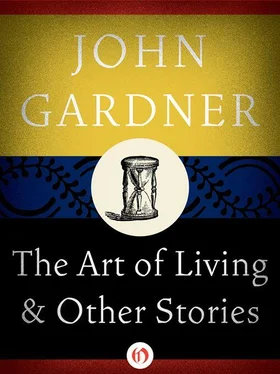John Gardner
The Art of Living: And Other Stories
Ich bin von Gott und will ivieder zu Gott.
[FOR WILLIAM H. GASS]
Seated by the window in the last row of the first-class no-smoking section, his large attaché case edged under the seat in front of him, his seatbelt snug and buckled, Benjamin Nimram drew off his dark glasses, tucked them into his inside coat-pocket, and in the same motion turned to look out at the rain on the gleaming tarmac. The dark glasses were his wife’s idea, an idea he’d accepted in the way he accepted nearly all her ideas, with affection and a tuck at the corner of his mouth that signified, though his wife did not know it — or so he imagined — private amusement tinged with that faint trace of fatalistic melancholy one might catch, if one were watchful, at the periphery of all he did. Not that Nimram was a gloomy man. When he’d put behind him, at least for public appearances, that famous “Beethoven frown”—once a private joke between his wife and himself but now a thing as public as the mileage of his Rolls, since his wife had mentioned both, in an unguarded moment, to an interviewer — he’d discovered that smiling like a birthday child as he strode, tails flying, toward the light-drenched podium came as naturally to him as breathing, or at any rate as naturally as the second-nature breathing of an oboist. He had mentioned to her — more in the way of trying it out than as sober communication of a determined fact — that it made him uneasy, being recognized everywhere he went these days.
“You poor dear!” she’d said, eyes slightly widening, and he had smiled privately, realizing that now he was in for it. “We’ll get a pair of those Polaroid prescription dark glasses,” she’d said.
“Good idea,” he’d agreed, seeing himself in them the instant he said it — the dark, heavy face, thick eyebrows, large nose, the somewhat embarrassingly expensive suit. “And a shoulder-holster, maybe,” he’d thought, but had carefully shown nothing but the tuck at the corner of his mouth.
“Is something wrong?” she’d asked. She stood in the doorway, half in, half out, trowel in hand, a paper bag of some kind of chemical clamped under her arm. He’d caught her on her way out to her gardening. She was smiling brightly, head tipped and thrown toward him, back into the room. It was the look she sometimes got on the tennis court, extravagantly polite, aggressive.
“What could be wrong?” he said, tossing his arms out. “I’ll pick up a pair this afternoon.”
“Jerry can get them,” she said. “I’ll phone in ahead.” Jerry was their outside man, a grinning young half-Japanese. What he did around the place — besides stand with his arms folded, or ride around the lawn on the huge green mower — had never been clear to Nimram.
“Fine,” he said, “fine.”
She blew him a kiss and ran out.
Poor Arline, he thought, shaking his head, slightly grinning. “I believe I was destined for this marriage,” she had once told an interviewer. Though she was sometimes embarrassed almost to tears by what she read in the interviews she’d given to newspapers and magazines, she continued to give them. She saw it as part of her duty as his wife, keeping his name out there. And though she tried to be more careful, knowing how “different” things could sound in print, to say nothing of how reporters could distort if they were, as she said, “that kind”—turning trifles to tragedies, missing jokes, even suddenly attacking her for no reason (one had once called her “a musical ignoramus”) — she continued to forget and speak her mind. Nimram praised her, needless to say, no matter what she said. Certainly there was never any harm in her words. Even her cunning, when she schemed about his “image” or the I.R.S., had the innocent openness of the Michigan fields around her father’s little place in the country, as he called it — a house sometimes visited, long before her father had bought it, by the elder Henry Ford.
There wasn’t a great deal Arline could do for him in the world, or anyway not a great deal he could make her feel he needed and appreciated — aside, of course, from her elegant company at social gatherings, for instance fund-raisers. She was “a good Michigan girl,” as she said; Republican, a member (lapsed) of the D.A.R. Subtly — or no, not subtly, but openly, flagrantly — she had been trained from birth for the sacred and substantial position of Good Wife. She was a quick learner — even brilliant, he might have said in an unguarded moment, if Nimram ever had such moments — and she had snapped up the requisite skills of her position the way a streetdog snaps up meat. She was not a great reader (books were one of Nimram’s passions), and music was not really her first interest in life, except, of course, when Nimram conducted it; but she could keep a household like an old-time Viennese aristocrat; she could “present” her husband, choosing the right restaurants, wines, and charities, buying him not only the exactly right clothes, as it seemed to her (and for all he knew she had unerring taste, though sometimes her choices raised his eyebrows at first), but also finding him the exactly right house, or, rather, Brentwood mansion — formerly the home of a reclusive movie star — the suitable cars — first the Porsche, then on second thought, of course, the Rolls — the suitably lovable fox terrier, which Arline had named Trixie. She had every skill known to the well-to-do Midwestern wife, including certain bedroom skills that Nimram waited with a smile of dread for her to reveal, in her open-hearted, Michigan way, to some yenta from People magazine or the L.A. Times . But for all that, she had moments, he knew, when she seemed to herself inadequate, obscurely unprepared.
“Do you like the house?” she had asked him once, with a bright smile and an uneasiness around the eyes that made his heart go out to her. It was only his heart that got up from the chair; the rest of him sat solid as a rock, with a marked-up score on his knees.
“Of course I like it,” he’d answered. “I love it!” When they were alone or among intimate friends his voice had, at times, a hearty bellow that could make Arline jump.
“Good!” she’d said, and had smiled more brightly, then had added, her expression unsure again, “It does seem a solid investment.”
Nimram might have said, if he were someone else, “What’s the difference? What’s a house? I’m the greatest conductor in the world! Civilization is my house!” That, however, was the kind of thing Nimram never said to anyone, even in one of his rare but notorious rages.
Her look of uncertainty was almost anguish now, though she labored to conceal it, and so he’d laid down the score he was fiddling with, had renounced the brief flash of doubt over whether he should leave it there — defenseless on the carpet, where the dog could come in and, say, drool on it — and had swung up out of his chair and strode over to seize her in his arms and press his cheek to hers, saying, “What’s this craziness? It’s a beautiful house and I love it!”
There had been, apparently, an edge of uncontrol in his heartiness, or perhaps it was simply the age-old weight of the world distracting her, time and the beauty of things falling away, nothing sure, nothing strong enough to bear her up — not yet, anyway, not as quickly as that — not even the strength in her famous conductor’s arms. “I’m sorry,” she’d said, blinking away tears, giving her embarrassed Midwesterner laugh. “Aren’t I a fool?”—biting her lips now, taking on the sins of the world.
“Come,” he’d said, “we eat out.” It was his standard response to all sorrows no energy of the baton could transmute; a brief arrogation of the power of God — no offense, since God had no interest in it, it seemed.
Читать дальше












